Folks scrambled to lock in mortgage rates in the hottest markets, no matter what the price. But prices declined or were flat in four of the 11 largest markets.
By Wolf Richter for WOLF STREET.
Canada’s housing bubble had been waning before the pandemic, particularly in Vancouver, but then came the crazy monetary policies of the pandemic, the tsunami of global free money, including from the Bank of Canada, and BOOM goes the housing bubble in Vancouver and some other markets – but not in all markets.
A year ago, the Bank of Canada got nervous enough to start tapering its purchases of Government of Canada (GoC) bonds, and it began to actually unwind its holdings of Canada Treasury bills and repos. It had already ended or halted its other programs, including the purchases of mortgage-backed securities.
Total assets have now declined by 14.3% from the peak in March 2021, to C$493 billion. The BOC has shed practically all of its Canada Treasury bills (purple line) and most of its Repos (green line). And over the past few weeks, even its holdings of GoC bonds started to decline (red line), as QE has turned into QT (quantitative tightening):
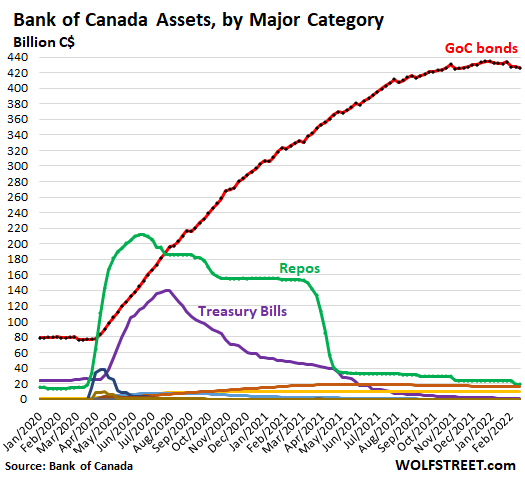
Yields jump.
The Bank of Canada wasn’t going to front-run the Fed with interest rate hikes, but market yields have shot higher, in parallel with the movements in the US bond market, in anticipation of multiple rate hikes this year. But those yields are still ridiculously low, in face of inflation that has now spiked to 5.1%.
The Canada Treasury 1-year yield on Friday closed at 1.25%, up by a full percentage point from October last year (data via Investing.com):
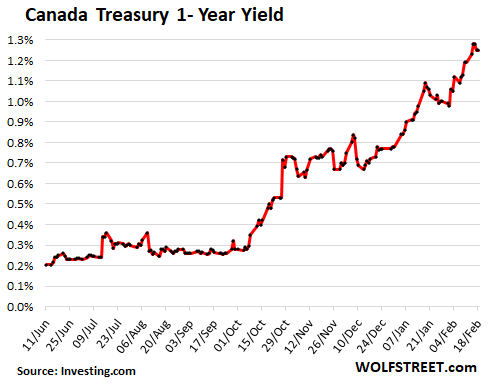
The Canada Treasury 10-year yield spiked to the highest level since February 2019 and closed on Friday at 1.95% (data via YCharts):
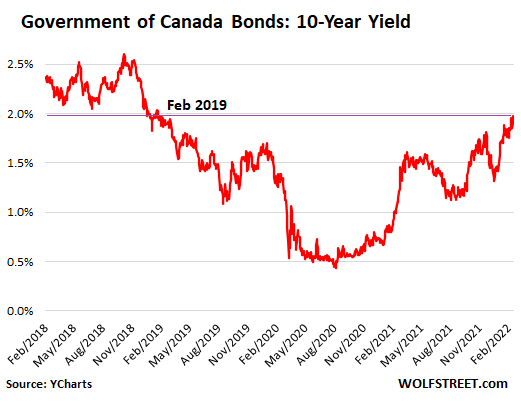
Mortgage rates are rising too, and a mad scramble has set in to lock in current rates before they rise further.
Home prices jump or spike, but not in all cities.
In several of Canada’s 11 largest cities, home prices jumped, including by a ridiculous 31.7% year-over-year in Halifax, according to the Teranet-National Bank House Price Index. On a month-to-month basis, prices declined in Ottawa and Quebec City and were essentially flat in Calgary and Edmonton.
In Greater Vancouver, house prices jumped 1.4% in January from December. Year-over-year, prices jumped 15.3%. Note the drop in prices that started in 2018 and lasted until the BoC’s reckless monetary policies during the pandemic bailed them out:
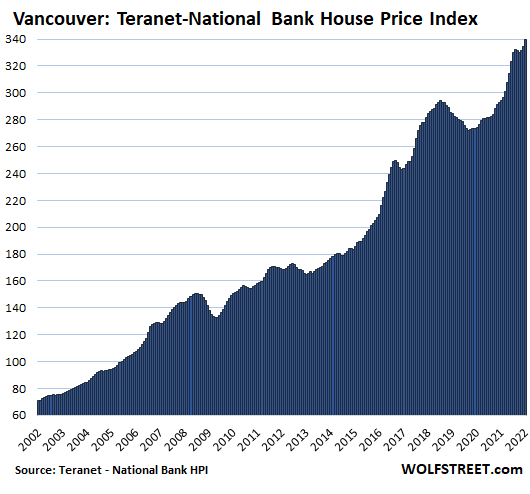
The Teranet-National Bank House Price Index is based on the “sales pairs” that compares the price of a house that sold in the current month to the price of the same house when it sold previously, tracking how many Canadian dollars it takes to buy the same house over time, which makes it a measure of house price inflation. The index is a three-month moving average.
In the Greater Toronto Area, home prices jumped 1.9% in January from December and by 19.1% year-over-year:
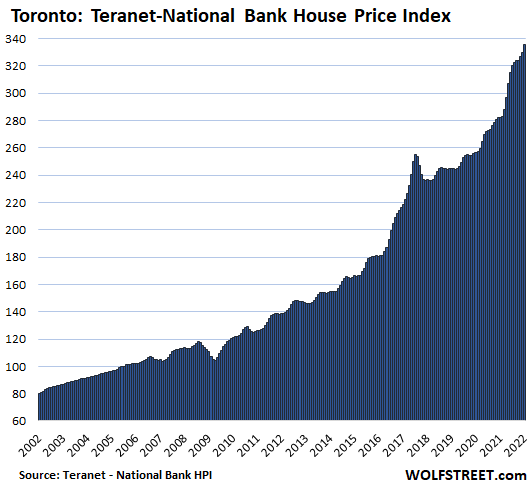
In Hamilton, Ontario, house prices spiked by 2.1% for the month and by 25.5% year-over-year, but that’s down from the 30%-spikes last July and August:
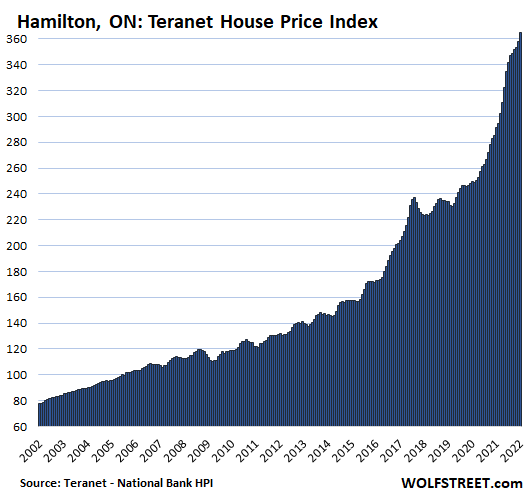
In Victoria, house prices jumped by 1.5% for the month, and by 20.8% year-over-year. Prices had flattened from 2018 through June 2020, when the BoC’s free money and interest rate repression kicked in:
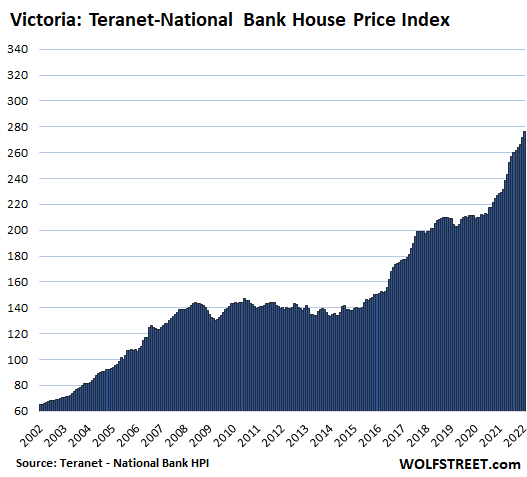
In Winnipeg, after two months in a row of month-to-month declines, house prices rose 0.9% for the month and 11.6% year-over-year. After the housing boom petered out in 2013, prices had remained about level for seven years until the BoC performed its miracles:
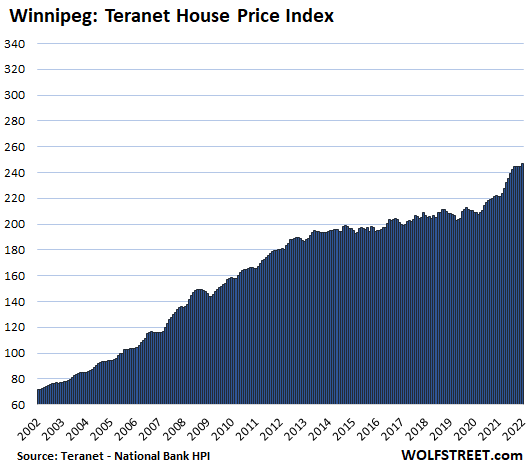
In Montreal, house prices rose 0.5% for the month and 15.0% year-over-year:
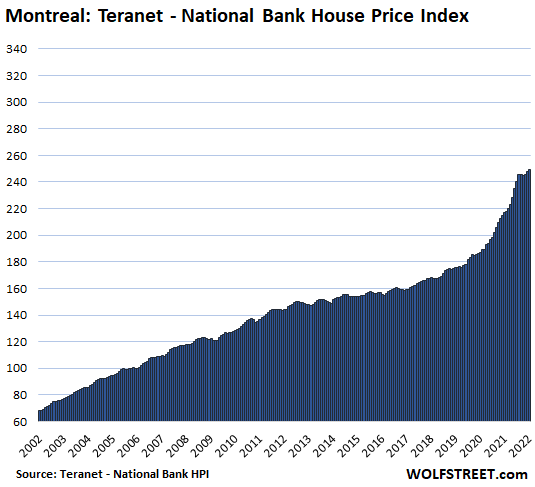
In Ottawa, house prices declined 0.3% for the month, the fifth month in a row of declines. This whittled down the year-over-year gain to 15.9%, from the peak last July of 28.9%:
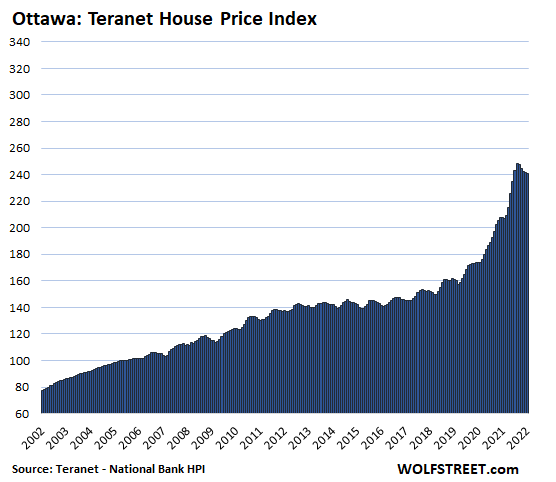
Halifax is king of the hill: house prices jumped by 1.2% for the month, and by 31.7% year-over-year. This makes it the ninth month in a row of year-over-year price spikes of around 30%:
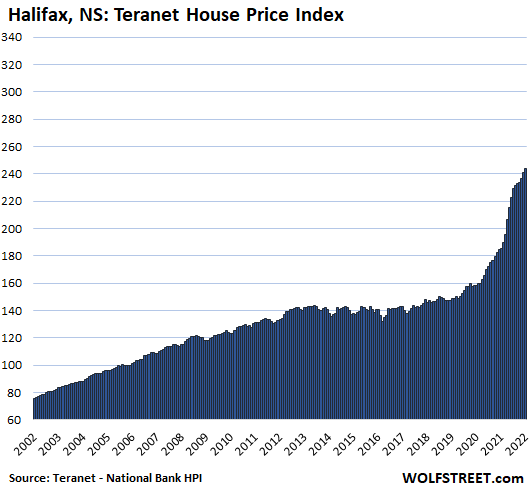
In Quebec City, house prices dipped 0.6% for the month, which whittled down the year-over-year gain to 9.4%:
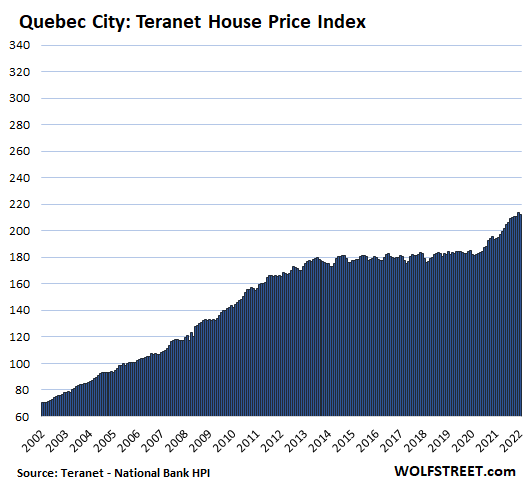
In Calgary, house prices were flat for the month and up 8.7% year-over-year. Calgary and Edmonton are Canada’s oil towns whose mind-boggling housing booms ended in 2007. And then, for 14 years, house prices went nowhere.
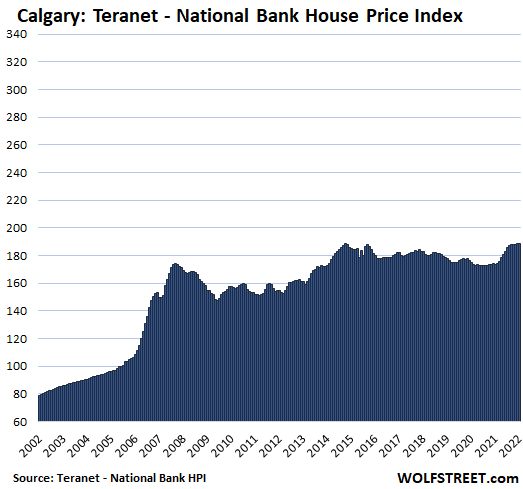
In Edmonton, house prices edged up after two months in a row of declines. Year-over-year, prices rose 4.3% and remain below 2007 levels:
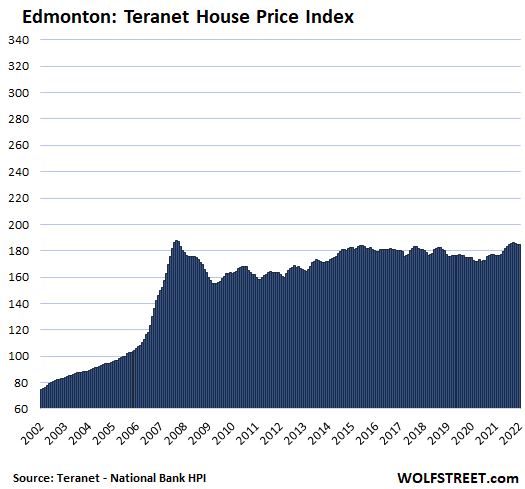
Enjoy reading WOLF STREET and want to support it? You can donate. I appreciate it immensely. Click on the mug to find out how:
![]()


The way I see it, the Canadian housing market allowed a steady flow of dirty money into the housing market that would make the banking system in the worst third world country blush.
Then for good measure, the banks let people take loans out on their existing properties so that they could buy second, third, fourth(!?) properties and goose prices further.
I don’t think people will sell (or be able to sell) if prices correct 5-10% and will continue to pay the mortgage and rent the extra properties until prices recover.
Unless people lose their jobs and are forced to liquidate before investing bankruptcy, I don’t this there will be a housing market crises.
We’ve already seen banks will allow deferrals and putting missed payments at the end of the mortgage, so they will do anything to avoid crashing the markets…
I love when people think that the only way homes are going to be listed for sale is if someone loses their job. Thank you for making people confused about what is going on while I take my shorts to the bank. Home builders are going to need a bailout within 12 months. And they aren’t getting it which is going to make me sleep very very well for years.
What are best banks and builders for Put options? Asking for a friend.
Renting isn’t going so well for the new crop of LL’s in Peterborough. I’ve been watching the same dozen for 3 mos., still sitting there. Prices have dropped but no takers these days.
The federal government plans to have something like 1.4 million new immigrants come to Canada in 2022.
They all need to live somewhere, so with a sever housing shortage, they’ll need to rent or buy into the existing housing stock.
The Canadian housing market is “too big to fail”, and the government and banking sector will do whatever they can to stop a crash.
Current property owners will also sit on properties paying the full mortgage even if housing prices correct a little. They will just wait it out. (they need to cover the difference to the bank if they sell less than the mortgage amount) So it’s the very last resort….
I personally think that’s a bad idea for the long run, but our politicians and business leaders only think short term.
Either way, I still think Canada has the perfect hotel California housing leverage / loan market ponzi funding scheme. (maybe Australia is a close second?)
I’m going to be shocked if on March 2nd the BOC leader Tiff doesn’t raise rates and there are not protests in response.
Failing to raise interest rates this month was to protect Tiff, Justin and Chrystia’s portfolios. Foreign money is okay to them so long as it helps them get richer at our expense.
All these people mentioned above own multiple homes. I’m embarrassed I voted for them and I’m never voting Liberal again in my life. They’ve sacrificed the future of this country to line their pockets.
5.1 percent? Apparently our government thinks we’re incredibly stupid.
Population growth doesn’t support your claim.
Are most or all of those people affluent enough to pay Canadian prices and rents, with no local credit history?
Is the Canadian government going to pay for (most of) their housing and if they do, how long is that sustainable?
Like anywhere else, Canada’s ability to “extend and pretend” is ultimately based upon the credit mania and currency value.
In their case, also dependent upon the US economy and its mania, since most Canadian exports go to the US.
The Canadian govt just did something that will kill the overseas investor market — they started freezing the bank accounts of people they don’t like. These overseas investors are fleeing that mindset already and don’t have to go to Canada to get more of the same thing they experience at home. I wouldn’t be expecting a huge rush of new immigrants.
I think you meant 0.4 million (400,000), which was about the level of 2021. Prior to 2021, the only time immigration to Canada reached 400,000 was in 1913.
People showing up in your country with suitcases full of YOUR currency just isnt a good thing. Change of ownership and power will be the result.
Any charts of Chinese buying US politicians?
which perfectly and succinctly demonstrates the fallacy in the thought that inflation is all fine and dandy as long as we can export it to foreigners.
once you’ve printed the currency, you can’t control what happens with it.
The argument that trade deficits dont matter rests on the belief that the dollars/currency must return to be spent in the host economy.
But lacking in the discussion from the Ivory Tower of Academia is that with the return of that money comes a change in ownership and an accrual of power from domestic to foreign.
Globalists don’t care about either.
It gets even worse some of the local Chinese sell properties back and forth amongst friends at higher and higher prices to push up the value of an entire neighborhood in a very short span of time. This spills over into entire regions.
Unless they buy gold = russia
I don’t understand why foreigners can’t buy real estate in China, but Chinese criminals are causing real estate bubbles in Canada.
It gets their money out of the country and Canada is ideally located. They share a border with the US and they have an extensive underground financial network that includes casinos for money laundering. They also have connections with drug cartels and the usual corrupt officials found in any country.
They do the same thing in the US. That’s what has driven some of the price hikes in Seattle, SF, etc.
You can’t move huge sums out of China legally. The players are already wealthy and powerful and connected to illicit services that can move the money.
Some of the scams are rather clever. They invest in a business here and then do something to hurt it, usually some tortious act by a second company. They sue and get a ton of money from the defendant, which they secretly own. The defendant is also a shell, having no legitimate business other to have a large bank account.
There’s a legal settlement transferring money to the damaged business in US dollars, and the dollars are considered assets here, not in China.
The defendant business disappears. The plaintiff closes down. This probably won’t work any more. https://abovethelaw.com/2016/03/getting-money-out-of-china-good-luck-with-that/
A common method in the past was M&A. That’s why Chinese property owners here sell back and forth at ever higher prices. The buyer overpays for the property. The seller then pays the difference between the transaction price and the market price to a party connected to the buyer as a “consultancy fee”. That “fee” can then be deposited in the buyer’s offshore account.
Then there’s the 2-way exchange. I want to move yuan out of China into dollars and you want to repatriate some of your overseas profits back into yuan.
I deposit yuan into your Chinese bank account from my Chinese bank account. You send me dollars from your offshore account to my offshore account.
It’s a hoary tangle of corruption involving bankers, businesses, bureaucrats, drug cartels and Chinese espionage.
Well said, UAE, UK, Canada and Swiss banks are top choices for people to keep and or invest their ill gotten money. In the meantime those who have been working hard to give their kids a financial floor to have comfortable leaving is finding impossible to do that.
The banks are going to try to avoid price discovery at all costs.
But the BoC aren’t driving this. The Fed are, the BoC will be forced to trail in their wake.
Can they achieve price discovery suppression? In theory, perhaps. Let’s wait to see what “in practice” delivers.
It’s mass migration (real numbers are closer to 600k per year with “temporary” migrants included) and an incredibly difficult environment to build in.
Dealing with officials in my municipality to build.my house was an absolute nightmare and costs due to regulations were nearly 40% of my build price.
The way I see it, America and Canada and the derivative EU, are like teenagers. Giddy with the naivete of good fortune, rejecting the toxicity of truth.
The future will be a time of less, whether we choose a sagacious or continue along a foolish path.
All will lose with the change coming in mortgages. Inflation has ruined the plans of the foolish academics.
Hi Mike,
The Canadian Real Estate Armageddon is already here…
It is official….
It is fully baked and just waiting to unroll….
“Canadian Parliament Warns Real Estate Prices Are Up To 50% Overvalued”
https://betterdwelling.com/canadian-parliament-warns-real-estate-prices-are-up-to-50-overvalued/
Wolf, do you think Canada 10 yr yields will parallel the US to yrs?
Looks like it. The BoC will likely run in parallel with the Fed.
Hi Wolf, Do you know if BoC and Fed communicate before decision making on rate hikes? Wondering because BoC is announcing decision March 2. Fed isn’t until March 16. If BoC follows the US and can only wait to see what Fed does that would suggest BoC won’t hike rates Mar 2, which will further fuel most of my crazy Canadian housing market. I’m in BC and seeing prices go up week on week in “hot” cities across Canada.
Also I’d be interested to get your take on if the first rate hike (eg, .25) will have any effect on demand & supply.
Thank you!
The Fed has made clear that it will hike on March 16. So the expectation is now that the BoC will hike on March 2 rather than wait till the April 13 meeting.
There is some chance that the Fed will hike 50 bpts. Until recently, I thought the Fed would stick to 25 bpts for sure, but then I changed my mind, and I think it’s possible that the Fed may go 50 bpts in March. But I don’t think the BoC will go that far on March 2. I think the BoC will go 25 bpts and wait for the Fed to make its first move.
Ciena,
Central bankers around the world all went to the same schools and worked at the same institutions and think tanks. They all know each other. Sometimes they just pick up the phone and sometimes they have a fancy conference somewhere. By the time a policy is revealed or enforced, they all already know.
IMHO at best the Fed tells the BoC.
They don’t have a conversation about it and the Fed couldn’t care less what the BoC thinks.
Parallel, Wolf, but probably two steps behind to keep the exchange rate “favourable” to support exports and employment.
Lol I like the subtle dig
Wonder what Zillow and NAR would say about the Canadian market. 20% yoy? 25% yoy? 30% yoy?
Just recently looked at the nifty rate search with my credit union. 30yr fixed up to 4.30%.
The real question is, if the bubble starts to pop will the fed let it do so or will they crack and try and catch a falling knife again?
Someone I know just got a 30 year at a credit union for 4%. They bought a older home on 5 acres for $170,000 which is low priced even for our area. Going to ride out and take a look as usually the land would be worth about $15K per acre here.
If I can find a bargain I am thinking about getting a 5 year ARM at 2.75% as that would allow me to spread out distributions from an IRA over 6 calendar years and manage my tax rate as I really don’t want a 30 year mortgage.
I live in Toronto and sold my semi-detached house in December, renting now and not planning to buy again because retirement is not far off and I’m planning to move back to the U.S. I feel lucky to have sold and benefitted from the mania, fomo, and low-rates.
It does feel that a sea change is finally setting up, with critical mass of upset people, both owners and renters, who want to see something done. People don’t like all the signs of greater inequality and dissatisfaction. Toronto has become a meaner place, and many people are upset about the change in the culture that seems to revolve about cut-throat calculation and real estate worship. Civic pride is harder to maintain when your working class people feel cheated. I would have been happy with 2x price gains after 20 years, but 4x really is not deserved, and I really do feel bad for those who are harmed by this housing market.
Thank you for your honest comment on this situation Brett
Brantford, ON is the next Manhattan:
“Some of the wildest markets in the country remain smaller and medium-sized cities in Ontario. Not to pick on Brantford, but that fine city—previously known mostly as the home of Wayne Gretzky—has seen prices rocket 86% in two short years,” highlights the bank.
Arent central bankers cute?
They SKEW everything they touch, and dont seem to notice. And they touch everything due to the cost of money influences.
“It is hard to imagine a more stupid or more dangerous way of making decisions than by putting those decisions in the hands of people who pay no price for being wrong. Thomas Sowell”
One thing that occurred to me about human history is that society seems to decline until it rests upon the best of the worst individuals.
How about Windsor? The capital of Boom and Bust in regards to Auto industry. Is already the New Manhattan. Median price $600K?? This is an aberration. Only investors are buying and outbidding themselves as the locals are priced out of the market. This investors can’t buy anything in Toronto or Vancouver for 1 million except a 100sqft shack or less, but…. in Windsor and area is a bidding war. What a shame, the young people will all live in the parents basement. Rich get richer and poor get poorer. Thank you Trudeau, you are a great leader in destroying Canada.
But Windsor doesn’t have jobs because the auto industry has failed there. The Chinese money launderer and the oil dictators have to buy mansions in America or France because if they buy the residential real estate the locals will do a trial on them, like the dictators of Equatorial Guinea.
The spike in Brantford is absolutely insane. It may be the home of Wayne Gretzky, but it is also the home of a massive drug problem and nearly all of the schools are among the very worst in the province. We’re talking bottom 200 out of over 3000. Nothing blows my mind about the real estate insanity in Canada more than Brantford.
“Civic pride is harder to maintain when your working class people feel cheated. ”
Good point. Societal ramifications of this redistribution of wealth from the decision making of central bankers is dangerous, just flat out unfair.
“When central planners decide, they intentionally assist one group at the expense of another.” F A Hayek
And it is clear that the central bankers have pushed wealth in one direction at the expense of another.
The biggest problem is not wealth inequality. It’s ultra-loose immigration policy.
If the elites cared about social cohesion, they wouldn’t flood the country with immigrants who mostly have no common culture. Same idea in the US.
The direct financial aspects (ultraloose monetary policy and allowing non-residents to buy homes which remain empty) are important, but reversible.
Reversing large scale immigration isn’t going to happen. It’s like trying to put toothpaste back in the tube.
yes. it also becomes a positive feedback loop, because mass immigration tends to create a voting bloc that sees themselves in any future potential immigrants, and votes to continue mass immigration.
immigration policy should always be calculated and measured such that the immigrants have time to assimilate. that’s not what we’ve had for the past 50 years or so.
August
“The biggest problem is not wealth inequality. It’s ultra-loose immigration policy.”
Could be both
When I learned that in the last federal election here in Canada you didn’t even need to show any kind of proof of citizenship to vote my arms almost fell out. When illegal migrants crossed in Quebec from NY state, these get voting rights by default, no questions asked. The Left, believe me, knows what it’s doing. If you’re an iota to the right of the leftists you are with white supremacists. I’m not too hopeful for our future. What a great waste this country had been made to be.
I am convinced that the problem is that man is an intelligent fool.
On average being in love with love.
How foolish is that !
The older I get the more I realize public policy shapes our lives and all we can do as peons is to try to make good decisions regarding ourselves even if we don’t like the game.
If we are fortunate to come out ahead then we can be generous by paying well those that give us good services or helping our children and grandchildren, but not so much that it spoils them.
Amen. Well said.
Yes, but if anyone looks at it objectively, you either have to conclude these people are incredibly incompetent or acting with malice. I’m not just referring to monetary policy, I’m talking about everything with a connection to public policy. I’m excluding “bad luck” as this seems a lot less likely.
It’s apparent to me that at least some of it is intentional.
It is not hard to figure out. Follow the money. Who pays these people? What is the effect of their policy decisions to their own finances? This explains virtually everything that happens in the world.
It seems to me that housing became the ONLY growth area in Canada once the lid was put on oil by Justin.
Now he can’t backtrack on his plan to go GREEN and the only card he has is keeping the housing market UP.
Until a new government comes in (God bless us all with the fools as bad as Justin leading the other parties) Housing will be king as there is nothing else.
Think about it….if housing and the stock markets go down, along with oil prices increasing, what hope would be left and imagine the chaos??
Young people haven’t had a chance to make those “good decisions”. Their options are all awful, with the exception of emigration. With the government and Bank of Canada determined to enrich already-rich Boomers, privatizing their profits and socializing their losses, and sending the bill to overworked and underpaid young people…how many will stick around? Or if they stay, how many will bother trying to climb the ladder when there are no rewards because selfish Boomers insist on hogging the senior roles until age 90 despite contributing nothing of value? Far easier to veg and collect welfare.
You are right about the plight of young Canadians, and yet these same young Canadians overwhelmingly vote Liberal. IMHO Liberal party of Canada is the principal driver of policies that inflate housing market (ultra-low rates, flood-like immigration, tolerance toward money laundering etc.). The other two major parties (Conservatives, and social-democratic NDP) were willing participants in these policies in the past, but seem to have reservations now. So let me ask this question – why young Canadians show such a devotion to the political party that objectively aims to impoverish them ?
AK – your perception of voter support seems frozen in 2015. It is true that the young are to blame for bringing Trudeau to power. It is untrue that they are the ones keeping him there. As numerous polls have shown, including most recently by Ekos and Mainstreet, the base of Liberal support is now the over-65 university-educated set. Your typical Liberal these days is a well-off, caucasian “Karen” in her 60s or 70s.
Recent Mainstreet poll shows the Conservatives ahead of the Libs 39 to 31, on the basis of youth support, especially young men. Voting patterns have flipped from what they were 5-10 years ago. The result of chronic wage stagnation, rising cost of living, and the deliberate inflating of a massive housing bubble to enrich the Boomer landed gentry.
The world is a kaleidiscope of feeling, of pain. I cannot change the world like we can. I can only do what I can do. Good on ya, brother.
Brett,
Beware capital controls. See my previous comment.
I’m a dual U.S./Canada citizen, and plan to retire in the U.S. after my 30 year career in Toronto. I am already paying significant cap gains to the IRS for my Canadian real estate sale. Hoping capital controls are not a problem for me because I have no plans to renounce my Canadian citizenship. I may live part-time in Alberta each year, and the rest in Florida and SE Asia.
I second Petunia’s comment.
Capital controls like the seizing of physical assets and hunting down people who express political dissent and cutting of their access to the financial system is some shaky ground.
International investors are sensitive to capital controls and political risk. Trudeau has increased both, to shut down a protest because it was loud and disruptive, you know, the definition of a protest.
These extended enhanced temporarily permanent super emergency powers are capital controls to shut off political speech. They are not only going after participants but sympathizers. Dangerous territory.
Denying new stuff to the serfs in one thing. People get angry when you take their existing stuff. If someone took my 18 wheeler and shut down my bank accounts I’d be very angry.
I feel like a lot of you are KKK people.
These laws were sold as cutting funding to islamist terrorists.
“Conservatives” were totally OK with the new possibilities for crushing dissenters and many even argued that they didn’t go far enough. They are overjoyed with glee in public when Occupy, BLM, Pipeline Protest or some other protest they don’t like are brutalised by the police*. Now their kind gets the boot and they are whining like the spoilt babies they truly are.
Well, fucked be them and the truck they drove into town in!
*) This should never even have gotten to Trudeu’s level. The local police or the state police should have enforced the law and cleared the street. The police refused to do their job and the then the state has to assert its lawful authority with the means that it has. The other means was the military!
Do you want a prize for winning the birth year lottery?
I’m utterly sickened by what Canada has become.
Since the usual mid-December low, average sales have gone from 1.045MM to 1.199MM. The spring and late-spring usually goes to May.
https://www.zolo.ca/toronto-real-estate/trends
I built my house 7-8 years ago and paid about $ 331,570 in a 25 year mortgage, but here’s the kicker its lost value so it’s worth only $308,980 as of my last tax assessment. My insurance says it’s worth $381,574, and I’ve paid it down to $256,284! The sad thing is that creditors go by what your tax assessment says your house is worth, so I don’t have $100,000 in assets only $50,000 in value that cost me $100,000. Not having it assessed by an independent 3rd party which would be fair to everyone they just go off of what the town says my house is worth! Within these years it has been worth up to $360,950! The value has changed like this;
+23, +6g, -20g, -1g, -16g, -1g, -14g! Can someone explain this to me?
Wolf,
Great insight as ever. Boots on the ground and this is what I’m hearing:
1 – COVID has forced people to work from home and this new space requirement has forced people to pay anything to have a home office etc.
2 – Canada has a tenth of US population but the same amount of immigrants. This drives the demand.
3 – The government will do anything to protect the homeowners “investments” including 40 or 50 year mortgages
4 – The governments debt is too great for rates to increase significantly.
Any of this holds any weight?
#2 is impossible. We have roughly the population of Canada in illegal immigrants (28 million IIRC) according to a (2018?) Yale study. The 11 million number that is sometimes tossed around is from decades ago.
Oops, I remember incorrectly. Yale estimates 22 million.
COVID doesn’t last forever, and what doesn’t stop these corporations from offshoring those work from home jobs to Asia?
#3 is correct as long as Justin Trudeau is in power.
5 – The Fed decide what happens to rates and the BoC absolutely has to follow. They just say they think it’s a good idea to justify their existence.
“they” aren’t driving
Not that I have any insight into what the most reckless Fed in history might do, only what I, myself, on first reflection, think should happen.
Firstly
We are at the point of recognizing that most people have been in a version of the great depression since 2008, when the central bankers last blew up the world. It is the feckless, academically dominated, Fed, trying to engineer an economic model in real time, that has distorted democracy itself, in it’s craving of greed.
What will they do ? Nothing until it collapses of its own weight, obviously.
Inflation is running at 7.5 to 12 pct. What have they done so far?
Threatened to open up a can of whoop ass and raise interest rates by 25 basis points and stop topping off the punch bowl.
First, housing prices will fall
The cut tulip is beautiful, and worth a lot, until it dies.
First, is the stock market, which appears to me, to be at least 50 % overvalued, judging by the fundamentals.
The housing market has allready outrun the ability of the normal family wage to afford the payment. Since I bought a small house with an enormous payment in 1982, I am familiar with the reprecussions of financial tightening on the housing market.
Thirdly, massive unemployment, as the synthetic American economy sees itself for what it is: a lie.
Maybe not. I have been dead wrong for the past 15 years, quietly waiting for the roof to collapse.
An era ends when the last hero dies. America and the western world has no heroes left. Only anti heroes.
Adam Vaughan vowed that he will never let Canadian real estate prices go down for the foreign investors (money launderers).
I went through the banks front door for a mortgage and they told me I only qualified for $500k based on my salary. Then I found the back door of the same bank through a broker. Now I qualified for $1.5 million as long as I paid the correct people off. See how this works and everybody is in on it. Anyone can get a mortgage for whatever amount you want but the question is can you make the monthly payments on it. That’s where the problem lies kind of like sub prime mortgages problem in the US.
I had the same experience with family member. When family member went to the bank, they asked for a proof of income, and said 400K at most. Then family member went to a broker, and broker “verified” income, and said 800K is the limit for a mortgage from another bank. The mortgage originating bank didn’t ask for proof of income – it was satisfied with broker’s “verification”. This mortgage will be insured by CMHC (i.e. government) if family member chooses to take it. So apparently both banks and the government don’t mean to enforce the income verification requirements that this same government itself introduced few years ago (and which did cool the market for a brief moment initially). My conclusion is that current government of Canada want things to be this way.
The one that told you the truth is always lying. You are at the mercy of the criminal banks (the Fed). Pray they don’t do a Volker to combat inflation and raise the interest rate to 300 basis points over inflation, 10+ %, until they need to. Like the 80’s.
Mike & Gen Z have stated a leaning Canadian people feel. The problem with the housing (and commercial.induatrial) increases comes a lot from money laundering. It’s estimated that $7.4B was laundered in BC in 2018, with $5.3B going to real estate. This was 4.6% of all BC R.E. From 2011-2015, it’s estimated over $200B came into Canada, about 2.35 GDP. Alberta was the top receiver, with Ontario and BC rounding the top 3 spots.
The Liberal Canadian government enforced the Emergencies Act to quell protests, while the Chinese money launderer is buying up Toronto real estate. This is one sick joke.
Crime pays in Canada. What if Canadians are better off committing crimes than working and living honestly?
Like I said before they don’t put stories in the news about local Chinese endlessly buying and selling homes back and forth amongst friends to push the values of neighbourhoods skyward in a very short amount of time. While not illegal the people should know what really is going on.
They’re not trying to push up prices. They overpay to squeeze some money out of the deal. The difference between the ask and price paid is given to a 3rd party as a “consultancy fee”. The 3rd party puts the money into the buyer’s offshore account.
Yes very common to see online people say the federal level can’t sort housing and the provinces need to, and that the split between them makes it complex.
All that “complexity” went out the window when capitalists were losing money. In a week.
above comment should read “about 2.35% GDP”. Sorry
Global central bank balance sheet still growing at about ~75 billion a month thanks to ECB perma-QE and another 30 billion of Fed QE this month. In the end, all stimulus is fungible
The ECB already cut its QE by a big chunk. Japan ended QE last May.
Canada is a very large country, as big as USA but has only one tenth of the population. Half of the Canadians live near US border areas. Obviously Artic circle is not habitable. So, they have a lot of land. Even during 2008, there was no housing crash in Canada. There may be a slowdown but crash is not going to happen. Yes, mania can be stopped. But prices are not coming down to the pre 2008 levels.
1. Notice the date 2/22/22.
2. There are two movies for you to watch. Wag the dog (1997) and Idiocracy (2006). If you cannot watch the both, please watch the first few minutes of the latter.
3. Gas prices are already up. $3.5 average on the lowest pumps. Are you satisfied?
4. They were wrong about everything from A to Y. Now in U they are right. Come on. I am not a pythonscript.
5. Luxury cars are transported in ships without a fire code.
6. Remember you are watched if you are logged on. In the phone, internet or microwave your tea.
7. Nobody want the word with ‘W’ now. Can you hear me?
8. Wolf, Please create a glossary and definition of all terms like inflation and stock buy backs. Otherwise, a lot of times would be wasted.
I’m in Canada and it’s insane.
Nobody understands that prices are land + construction, and that in the urban areas most of the cost is land (which is why a house in Toronto costs multiple more than one in the middle of nowhere).
Canada has land coming out of its ears. It’s unbelievable how much there is. Land should not be expensive. If I drive out of Montreal it’s fields everywhere in no time. Forget the Canadian Shield crazy stuff.
We are basically living in a gulag where we can see land but the govt says:
1. I want 50% of your wages
2. You have to buy this apartment for 500k, no you can’t build just over there
This is a political construct to farm workers.
It’s an interesting situation that I haven’t looked into much. Lower 48, Alaska, Australia all have the same situation of being extremely large places, but most people are bunched up together.
Is a pythonscript some type of coder parlance for psychologist?
If so I got yer message.
Mania is a necessary human emotion. Usually instigated by the depression of the sameness in both male and female of the species.
1) Canada is protected by two oceans, by US south and the west and the polar bears in the north.
2) Canada live under John Rawls theory of justice 1971. The Canadian
are shielded by a “Veil of Ignorance”. They don’t know where they belong
and which position in society u should hold.
3) John Rawls is risk averse, support the poor with welfare and medicare.
4) Justify civil disobedience to achieve justice.
5) Promote shame, fairness, self respect against the opposition.
6) Equal liberty, distribution., inimize inequality, or eliminate it all
together, max welfare, because it’s all about power.
I believe the saying is you can not have equal liberty and equal distribution.
Wolf the part that matters is its mostly speculation. If you take a look at who is buying the homes, you find they are mostly 2nd+ home buyers and investors.
1st time home buyers are falling rapidly. What do you expect when the gov has a policy to get lower equity mortgage stress test – requiring approval at 5.25% rate (even if you can a lower) but investors can get non mortgage loans and existing home owners have equity to pull.
As we all know, if you don’t live in the house, (rental/vacant/etc) you usually the first to sell if there profits even slow. Actual number of homes to people is slightly higher than the USA and 2q/ft house per person is highest in the OECD countries. we have had huge spikes out of cities, but moving data shows much less movement than you would expect.
Add the money laundering that has gone on for years (when our government says they chase $25 in foreign contributions) and bank of Canada not reducing mortgage backed securities… and its clear that the GDP contributions of housing (largest portion of Canadian GDP now) all shows this has being propped up still.
One of the big problems is new homes prices keep on being jacked up by the builders as the Chinese try to outbid other Chinese. It’s gotten to the point where a new townhouse in satellite cities is about four times what a married couple who are first time buyers could ever afford.
It is just not chinese buyers. It is India, Russia, and Europe buyers too.
I was talking to a realtor. A company in India has bought 44 or 47 g homes in his city this year just from one Indian relator in his office. All cash, no inspection, no contingencies.
A local paper also did an investigation into who was buying homes. Most are LLC so they can hide who the real buyer is but if found a trail that led mostly to Europe and Russia. This is a midwest city.
In Canada the Chinese always outbid the other races of people. It will always be the same in the future unless the real estate market implodes in China. All the realtors in Canada will tell you the same thing as they’re the ones doing the selling.
I too would be interested in seeing home-buyers tallied by by number of homes owned.
This would help gauge the amount of speculation in the market.
It has to be speculators now.
Housing is priced in other houses. Prices have detached from wages.
“Housing is priced in other houses.”
This says it all.
Canada, could stop the foreign bubble, if it exists, in a heartbeat, through taxation. I have always found Canadians, all hat and no cattle, all mouth and no song.
Pretty nasty to work with.
Not sure you have ever met a Canadian. They are in general very pleasant. “Canadian” is a synonym for “nice”.
Regarding real estate taxes for foreigners. Canada has them in spades. First as a foreigner you pay additional 15% tax on purchase and then if you don’t live there year around you pay an additional yearly 1% property tax surcharge.
Saw a good interview with a former fixed income manager who was really sharp. He explained that modern economy is largely driven by the combined government deficit and banking credit. The rate of change in that debt went to all time high with Covid stimulus deficits and government backed bank loans to heading straight down right now so that rate of change is crossing zero at anytime.
This year is going to be nothing like 2020 or 2021 unless the money printing gets restarted.
If you are anticipating the great housing crash in 2022, I am afraid you will be disappointed. Canadian government had shown remarkable ability to keep housing market in the pathologically inflated state for decades now. My impression is that the entirety of economic policy of government of Canada is aimed at preventing any kind of upset to housing market, and isn’t very concerned with other sectors of Canadian economy. Mining, oil and gas, manufacturing, agriculture all seem to be an afterthought at best IMHO.
No one ever expects The Spanish Inquisition!!
No, but secession might
Chinese plundered the world of money ,now spending it wisely,but have huge fiscal issues in homeland ,this global economy idea really isn’t working well
Some of these housing charts look totally insane. They were already insane in 2019!
I can’t believe people still think that this will somehow still end well.
Over the past twenty years home prices doubled, tripled or quadrupled in some Canadian cities. That is from single digit housing inflation. What would double digit housing inflation look like?
There have been recent reports of dozens of Chinese ghost cities, abandoned partially completed residential towers without windows and doors and falling real estate prices. Did the Chinese invest in Canada real estate too?
I have only been in Canada once and only in Vancouver, in 2018. At times I thought I was in China. Many signs advertising properties, in Chinese! The two B&B’s I stayed in (in Richmond) were also Chinese owned and run. At least one of them owned multiple properties.
Seeing all this was quite a shock after 5 months hiking/camping in the wilderness, but even without that, it looked extremely bubbly to me with all the advertising pushing property.
China itself is of course much worse even. I read yesterday that prices in Beijing are about 50x the average salary.
You are correct that many of these towers in China are empty and cannot even be lived in, because they lack all fittings. They are purely built as speculation objects. People just buy square feet.
I was also surprised when I first visited Richmond (Vancouver suburb). I thought I was in China. We have older Chinatowns in the US, but I don’t think we have exclusively Chinese suburbs. Not that there is anything wrong with it, just unusual.
This belief is a subset of a bigger belief. A few reasons for it include:
First, believing otherwise is contrary to their personal preference. They don’t want to believe that society and especially them will become poorer or a lot poorer.
Second, a belief in magical thinking. That’s what a belief in the ability of central banks and governments to prevent declining living standards represents.
They believe in a secular economic priesthood (one of many composed of “experts”) who (supposedly) have abilities mere mortals lack simply by joining a central bank or government agency.
Third, they are math challenged, believing 1+1 = 3. It’s a belief in something for nothing. Yes, it really is different this time.
That’s what believers in “democracy” also believe.
Fourth, some of them also implicitly seem to have a mystical belief in technology and “science” to solve every conceivable human problem.
Fifth, westerners (and especially Americans) mostly implicitly believe the US led world order will never end. They won’t admit it but seem to think that the replacement (most likely dominated economically by China) will be a continuation of what we have now. We don’t actually know that.
Its a ponsi scheme, if you want to win guess month and year of the end. I will go first, 09/2024
Also remember the banks are fully protected as they are now considered an ESSENTIAL service, thus are “too big to fail” in Canada.
Combine this fact with the CMHC insurance.
If anything crashes, the banks will be made whole by the taxpayers. As usual….nice gig isn’t it?
Unreal.
EQ Bank or Equitable Bank will be the first one to go poof if the government doesn’t step in. Buffett has a stake in Home Capital but who knows what will happen? EQ Bank can never survive without a government bailout if real estate prices start falling in Ontario. Both of them are backed by real estate in Brampton, Mississauga and Milliken Mills. In 1989 the owners in the same towns simply left the country and went back to India and Pakistan leaving the banks on the hook to sell the properties at a loss. Non recourse mortgages mean nothing today. Both banks have a TSX listing.
Don’t fret. The IVY league economatricians have this one figured out.
All right, everyone willing to lend Italy their money for 50 years at .05 pct interest, step to the front.
Money always lies. Honesty always suffers.
This one, like all the crashes leading up to this one, seems to be a problem for the schlubs like you and me. Financial protection is a luxury in the land of the free.
The Fed is going to save the wealthy like they have been doing for the last 50 years. There are no American heroes left alive. Only pretenders.
The biggest wealth transfer in history and the investors are buying up all the houses on market with that cash. It looks like WEF is well on its way to implementing the Fourth Industrial Revolution.
A new round of writing puts for all the assets of the flight capital folks and middle classes (nosebleed stocks and houses) and restive poor could be quite a stress-test, eh? Wheelbarrows of digital currency? Can’t even burn those for heat. What has “moneyness” then? What networks and networkers survive and which are cancelled?
I said many years ago, probably on this website, and it’s more true today, the Canadian economy is a one trick pony and that trick is the housing bubble currently expanding throughout Canada. ‘Official’ inflation in Canada is lower than the US, there is no impetus for the Bank of Canada to take away this punch bowl anytime soon. Unofficially, inflation is rampant throughout the economy. Food and gasoline in my home town in southern Ontario is as expensive than San Francisco, where I live today. Let that sink in for while. Since the people there make half as much a I do, I don’t know how they are surviving.
Hang a sign anywhere claiming a place is “paradise,” and through the madness of crowds, it will be utterly ruined in a short time. Taoists a thousand years ago understood “beauty” as most comprehend it and respond to it is a mirage.
That’s why I hate the movie Under the Tuscan Sun. That movie ruined Tuscany.
Or hang a sitcom anywhere that says “The dream of the 90”s is alive in… .”
30 year fixed rate mortgages are generally not available in Canada unless you can get one from the Bank of Mom and Dad. The typical residential mortgage is written for 5 years with a 25 year amortization schedule. If interest rates go back up to more normal rates by 2025, a lot of recent home owners may have trouble refinancing their mortgage.
I don’t think government of Canada will allow hosing market to crash even if interest rates are forced up by popular discontent due to rising prices. For example, government can allow interest-only mortgages, or longer amortization periods, or tax deductions of mortgage interest, or whatever they can come up with.
This is not to say that Canadian government is fully comfortable with the skyrocketing housing market. I think they would like to slow it down to more tolerable pace, and they did it already once (around 2018, right after Liberal government got majority), but for some reason they are not doing it again.
Canada’s “hosing market.”
>:-{}
Taked off, eh?
It gets better. In the last 2 years there has been a big shift to variable rate mortgages. 30% were variable in Oct 2021.
So no need to wait for the fallout!
They won’t even get that far. The banks will be contacting the home owners to put more cash up front as the prices fall and if they don’t have the money the banks can repossess the properties.
The Brits and their progeny seem to have become more and more amenable to accommodating flight capital in lieu of actually working in the old, outmoded sense. That and being a rent-seeking incumbent. In my tiny way I am guilty of it too. Why should I build a better world when I can sell out to an arriviste, and just glide?
This is anglo culture.
Look at where the worst housing bubbles are – all are former British colonies.
Even within Canada, Quebec has less of a bubble as there are less anglos here.
The American dream: start a business.
The British dream: become a landlord.
And they *still* have an hereditary monarchy.
Un bon point !
Montreal used to be cheap and the ladies there didn’t judge me on my lack of assets. Toronto is where you have to own real estate just to have a convo with a lady.
Hey Wolf. You should read an opinion in the WSJ 2/19 Saturday issues.
————————–
The Fiscal Theory of the Price Level” is the title of Mr. Cochrane’s next book, to be published in the fall. It’s a challenge to monetarism, the theory of controlling money as the chief method of stabilizing the economy. The new theory holds that when the overall amount of government debt is more than people expect the government to repay dollar declines., we see inflation. The price of everything goes up, and the value of the dollar declines.
Why hasn’t “fiscal inflation” of this kind happened sooner? After all, the government has been borrowing money, as Mr. Cochrane puts it, “like the proverbial sailor”—the drunken one—for decades.
How does this work? “The U.S. government has $20 trillion of debt outstanding,” Mr. Cochrane says. “That means, over the long run, people must expect taxes to exceed spending by $20 trillion to repay the debt.” But if they think the government will be able to pay back only $10 trillion in today’s money, “people will try to get rid of their government debt fast, before it is worth less. They try to sell it in order to buy other things,” driving up the price of everything else. “That keeps going until all prices have doubled—until the $20 trillion promise is only worth $10 trillion at today’s prices.”
“Inflation comes when government debt increases relative to people’s expectations of what government will repay,” Mr. Cochrane says. “If the Treasury borrows but everyone understands it will later raise tax revenues or cut spending to repay the debt, that debt doesn’t cause inflation.” The borrowing and money-printing in 2020-21 was different: “It came without a corresponding increase in expectations that the government would someday raise surpluses by $5 trillion in present value to repay the debt.”
———————————————-
Basically it is saying that unless you have Fiscal control with monetary (raising rates) control , asset prices will keep going up. Maybe this is what Blackstone see coming. Thus you can raise rates like in Argentina or Brazil but that does not stop the price of assets going up and up.
That may happen if the Government keeps increasing the deficit and the FED keeps buying the debt the Government sells?
This will be interesting how it plays out. I have the popcorn ready.
Um, looks like supply and demand? Like, you raise the supply of something (money, credit, government promises, whatever) and at some point demand for that (its “value” relative to other things, its credibility) goes down? Which is kind of like, uh, the claims of monetarism?
Was reading that 302 years ago this month that the first Ben Bernanke (John Law) blew up the French currency. Complicated hair brained ideas about currency, don’t work. All you need is people to smell out that it’s going down fast and people jump ship.
MMT relies not on rate increases to control inflation, but TAXATION.
Thus, when inflation becomes politically unbearable, the government DRAINS money from the private sector….private sector shrinks, government increases in size.
This explains why the bureaucrats seem to love MMT. Bigger G.
So, one could surmise, that a Government that constantly over spends, with a Fed that absorbs that debt …. inflation is the first result, the second result is increased taxes. The final result is BIGGER GOVERNMENT …. all a result of governmental actions with Fed team work.
Money-launderers from China have picked clean the carcass of Canadian society via parasitization its housing market. The country belongs to them now. Canadian citizens under 40 – hell, maybe any Canadian citizen of any age – would be best advised to emigrate or at least acquire a second passport to have the option to leave at any time.
A good book on how money-launderers and drug traffickers have deeply infiltrated Canadian finance and government is “Wilful Blindness” by Sam Cooper. It’s a shocking read.
There are lots of places in the USA where you can buy reasonably priced homes (hello! Flyover) but you don’t really have that in Canada, everything seems overvalued.
We like our homes, especially in winter. Try Edmonton or Chicoutimi in January.
The problem in Edmonton is you have to live there to buy. There’s no one to rent to and all the property managers are crooks. This is the reason no one has bought there out of province yet. All the locals in Edmonton have no money because they lost all of it on the homes they own since the spring of 2007. Resale one bedroom apartments were selling for as little as $35,000 Canadian in Edmonton last year.
The Chinese money launderer and the dictator from a third world oil producing country will buy up Canadian real estate, while the Canadian government seizes Canadians’ bank accounts for what they post online.
That isn’t really the whole truth. Yeah there are a lot of homes that would be inexpensive to those living in wealthy coastal states but the local wages don’t support the housing prices in the vast majority of the US right now. We are in a nationwide housing bubble. As typical the trendy cities and states are taking it the worst and the western states have the highest runup in prices.
Unless you are able to take your well paying job to flyover or sell your fancy house and relocate to flyover, you’re SOL.
” local wages don’t support the housing prices ”
But the Federal Reserve does…..and has…with their pegging of mortgages at record levels BELOW inflation.
And there is plenty of hot money, money that refuses to be idle and harmed by inflation, willing to commit to real estate, especial real estate that can be purchased with these cheap dollars and under replacement costs..
Where would one go in Canada to downsize?
There’s oodles of opportunities in the USA to be an equity refugee
Yep, from the time when Champlain came over until 25 years back they could build houses with less JCBs, smaller trucks and machinery for the logging, no computers, no mobile phones, no computer aided design, worse tech, less human knowledge / experience. They built bridges, infrastructure, damns, roads.
Now apparently all of this is not possible. “We’ve run out of room”. What about over there with those fields right near the other housing and the power lines? “Oh yeah you can’t build there”.
Productivity in all jobs is massively up. Yet apparently now man and wife must work for decades to have a home, when before one man’s labour in a less productive job could have that same home at far less time.
It’s artificial scarcity. Canada has the land, but no, you have to buy the blessed land and pay their price. How is the price set? By the amount their banks will lend. How much will their banks lend? Well let’s see …. they will create (out of thin air) credit that will take you and your partner a lifetime to pay off.
You won’t pay it? Well I’m going to lend the same amount to everyone else so they will all outbid you. And I’m going to amplify the pressure by building 200k and allowing in 400k immigrants a year!
Welcome to the open prison. Aren’t you glad you live in a democracy instead of that nasty Putin guy?
Those “reasonably” priced houses in flyover country only appear so by comparison with cities, and with especially bonkers bubble states like Florida and Arizona.
The real estate market in Canada in combination with the immigration policy is a perfect racket, set up by big money (developers and banks) and government, to secure steady high profits for the one percenters. Most immigrants end up in the big cities and that pushes demand and prices up. Everybody from cities (via taxes) to banks, realtors, lawyers profits by rising housing prices.
One reason for the comparable low rise in house prices in Edmonton and Calgary is the continuous overbuilding of said cities. The amount of new houses and apartments added every year is quite staggering. Also, a high number of houses in older neighborhoods are being torn down and replaced with higher square footage houses. If the oil price is going to continue the present price rally for the next couple of years there’s gonna be another boom and house prices are gonna go through the roof once again.
They had to lower the points for immigrants last year to meet their quota.
People with in-demand skills know how to assess their options.
They are going to write down their wage offer from a Canadian company on the back of an envelope, along with several other offers from other countries.
Gross wage. Canada: not good.
Net wage. Canada: not good.
Food costs. Canada: quite high.
General goods. Canada: quite high.
Housing. Canada: astronomical.
Skilled immigrants will not come. They will have to reduce points further and further.
One thing not shown on this page is how crazy Canada is compared to other G7 countries.
Google: economist global house prices
Select Canada an *anywhere else*. Marvel.
The Fed is trying to reel in inflation slowly. Problem is ‘slow’ doesn’t exist when there’s a significant change in everyone’s attitude. Not there yet, it appears. Stimmies gone. Wages not keeping up. Cure? Sure, glad you asked. Problem is cure isn’t possible unless there’s comprehensive tax code reform. And that’s not possible. So we’re screwed. Cap controls? Sure, again impossible. National job guarantee? Sure, best inflation fighter policy of all. Will Congress do that? No way Jose. They don’t even know what that is. Ignorance on heroin. Trusting the meth labs of democracy (i.e., states) to do anything correctly is, well, impossible. Sayonara. Enjoy the kabucki.
Slowly? Almost undetectable…….
Quick to intervene when the markets flirt with levels from two years ago..
but SLOW to react to an everyday punishing inflation they caused, that is doing great damage to the American citizen.
Our public officials’ competence is degraded, mirroring the decades-long decline in Flesch-Kincaid level of presidential speeches.
“The Fed is trying to reel in inflation slowly.”
No, they’re not. They actively stoking inflation right now, still purchasing MBS and US Treasuries. The FED has, thus far, done NOTHING to stop inflation. Let’s make that perfectly clear. In the face of the highest inflation in almost 50 years, the FED is continuing to pump it.
Let’s be honest. This is intentional. The FED does not want house prices or stock prices to ever fall. They want to blow the biggest bubbles mankind has ever seen, and then they want to make those even bigger. If a gallon of gasoline is higher than a day’s wages, they could not care less. They have no idea what it’s like to actually have to earn a living to support oneself. They are a protected class who live in their ivory towers, insulated from what’s actually going on.
The irrationality of the Aristocracy is an insult that Americans are willing to accept in their quest for relevance. Ignoring the gaping wounds as if they are justified.
Brent crude is almost at US$100 a barrel. Inflation. What happens to the recession that is coming?